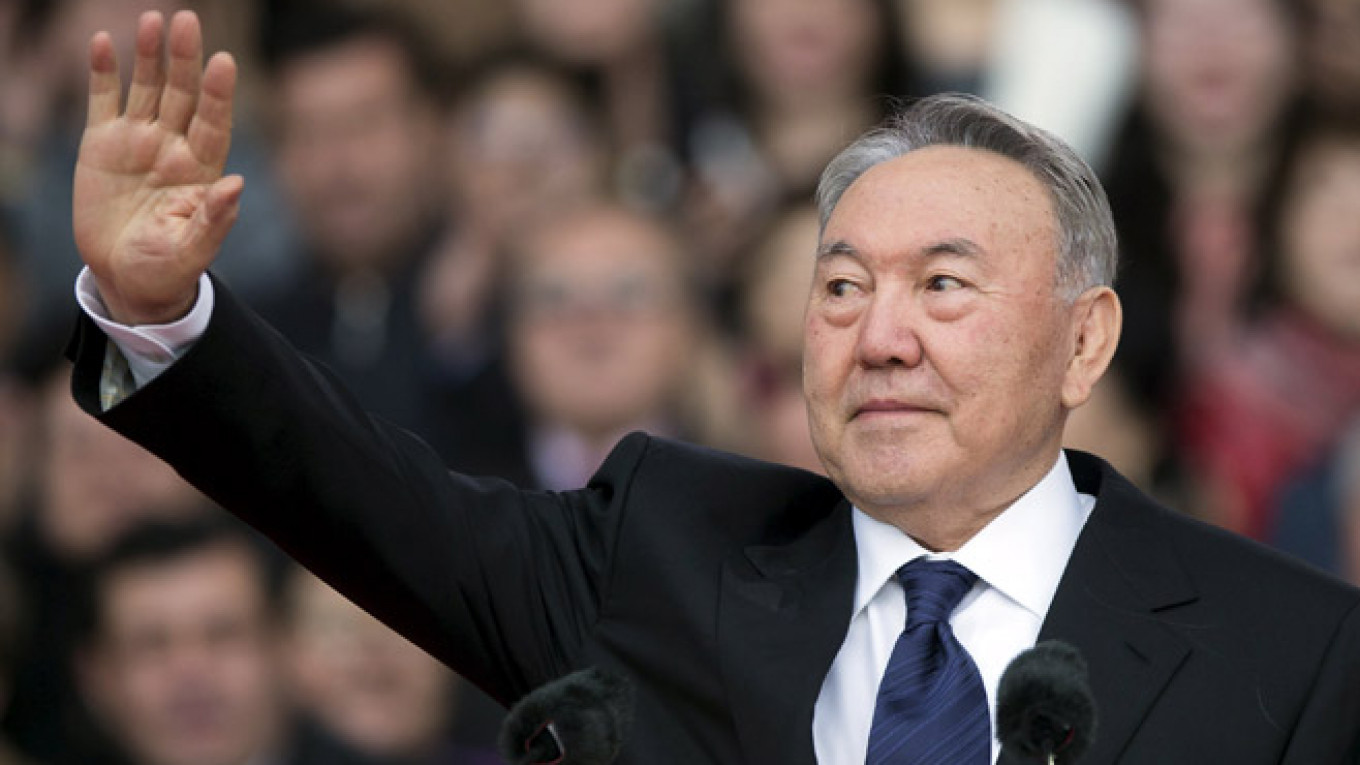ALMATY — President Nursultan Nazarbayev will extend his nearly 26-year rule of Kazakhstan in an election on Sunday that investors hope will maintain stability in the Central Asian state despite criticism of his rights record.
The 74-year-old former steelworker has held power since 1989, when the oil-producing nation of 17 million stretching from the border with China to the Caspian Sea was part of the Soviet Union, and has never faced a genuine challenge at the polls.
Usually met by huge crowds, he has toured his vast steppe nation, opening shopping malls, recreation centers and even two underground metro stations in the financial capital Almaty last weekend. He looks down from huge billboards. "To new victories together with the Leader of the Nation!" read one.
An ally of Russian leader Vladimir Putin, he called the vote a year before his current term is due to end, removing the danger of growing economic pains developing into a full-blown crisis that might dent his chances of victory.
The two other candidates, a communist and a former regional governor, pose no threat and Nazarbayev can stretch his rule to beyond 30 years if he completes a full new five-year term.
Kazakhstan's small and disparate opposition has called for a boycott. But Nazarbayev, who won almost 96 percent of votes in the 2011 election, is popular and often referred to as "Papa."
A generation has grown up knowing no other leader, and opponents have been jailed or fled abroad. He pays little attention to criticism over what rights groups call crackdowns on freedoms of speech and assembly.
No election in Kazakhstan has won a clean bill of health from monitors.
Nazarbayev's platform emphasizes economic reform, political stability, interethnic accord and social cohesion in the mainly Muslim, multinational state.
"A strong state and economy come first," is his motto.
"I, and you too, witnessed the Soviet Union's collapse in 1991," he said in a recent speech. "In Russia, what they've got is antipathy for the very word 'democracy.' It has become a synonym of poverty, thievery and murder."
The biggest challenge to his authority was a riot in the oil town of Zhanaozen and a nearby village in 2011, when police shot dead at least 15 people. A critic of the president was later jailed for more than seven years on charges of rallying oil workers to try to topple the government.
Nazarbayev has overseen market economic reforms and brought in over $200 billion in foreign direct investment, making the country the second-biggest economy in the former Soviet Union, with only Russia producing more oil among ex-Soviet states.
Investors feel relatively safe helping develop Kazakhstan's vast natural resources as Nazarbayev maintains strong relations with neighbors China and Russia as well as the West.
"We know that Nazarbayev is a constant, we know what to expect of him," said Edward Mermelstein, president of U.S.-based Alfa Consulting Group that provides business advice focused on Eastern Europe and Central Asia.
"He's made it clear he's not a puppet of Russia and that he is not also someone to be used by the West."
Kazakhstan has, however, felt the impact of an economic downturn in trade partner Russia, which has been hit by Western sanctions in the Ukraine crisis and a fall in global oil prices.
Kazakhstan's economic growth is expected to slow to 1.5 percent this year after 4.3 percent in 2014. It could even contract this year if the price of Brent crude falls below $50 per barrel, Kazakh officials say.
Nazarbayev has cemented ties with Moscow by joining a Russia-led political and trading bloc called the Eurasian Economic Union.
"The upcoming election actually offers no alternative to Nazarbayev," Amirzhan Kosanov, an opposition leader, said. "This is why they selected so weak and little-known sparring partners for the incumbent. People just laugh at them."
A Message from The Moscow Times:
Dear readers,
We are facing unprecedented challenges. Russia's Prosecutor General's Office has designated The Moscow Times as an "undesirable" organization, criminalizing our work and putting our staff at risk of prosecution. This follows our earlier unjust labeling as a "foreign agent."
These actions are direct attempts to silence independent journalism in Russia. The authorities claim our work "discredits the decisions of the Russian leadership." We see things differently: we strive to provide accurate, unbiased reporting on Russia.
We, the journalists of The Moscow Times, refuse to be silenced. But to continue our work, we need your help.
Your support, no matter how small, makes a world of difference. If you can, please support us monthly starting from just $2. It's quick to set up, and every contribution makes a significant impact.
By supporting The Moscow Times, you're defending open, independent journalism in the face of repression. Thank you for standing with us.
Remind me later.






